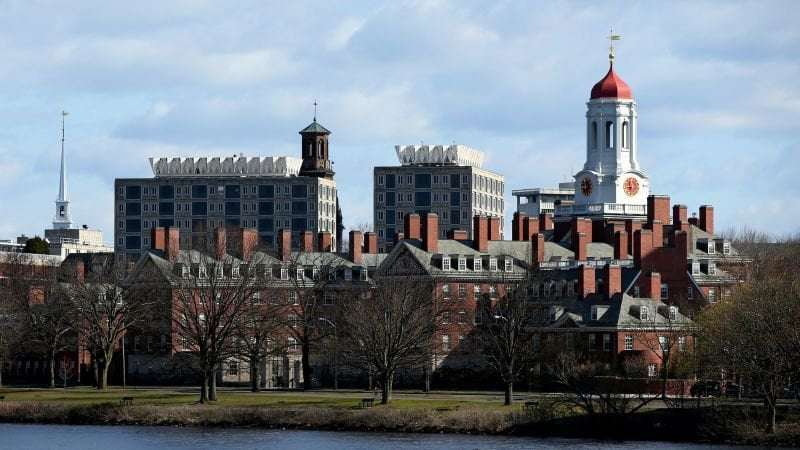Three minority advocacy groups are suing Harvard University’s governing body, accusing the school of discrimination by giving preferential treatment to children of wealthy donors and alumni, and are citing the recent US Supreme Court ruling that gutted affirmative action to bolster their lawsuit.
The lawsuit, filed by the Lawyers for Civil Rights group on behalf of the Chica Project, the African Community Economic Development of New England, and the Greater Boston Latino Network, alleges the students who receive that preferential treatment are “overwhelmingly White,” and make up as much as 15% of admitted students.
“This preferential treatment has nothing to do with an applicant’s merit. Instead, it is an unfair and unearned benefit that is conferred solely based on the family that the applicant is born into,” Lawyers for Civil Rights said in a news release. “This custom, pattern, and practice is exclusionary and discriminatory. It severely disadvantages and harms applicants of color.”
The lawsuit comes less than a week after the Supreme Court gutted affirmative action in college admissions, ruling schools can no longer take race into consideration as a specific basis for accepting a candidate.
The lawsuit cited that ruling and quoted the Supreme Court’s majority, which said, “College admissions are zero-sum, and a benefit provided to some applicants but not to others necessarily advantages the former at the expense of the latter.”
The plaintiffs in this new lawsuit allege a portion of the White students admitted to the school because of donor and legacy preferences would not be admitted otherwise, which would increase admissions opportunities for applicants of color.
“The need for the Department of Education to put a stop to this discriminatory practice is particularly acute now that the Supreme Court has severely limited the use of race as a factor in higher education admissions processes, which is expected to have a negative impact on campus diversity,” the lawsuit said.
According to the plaintiffs, “Black, Latinx, and Asian American applicants are all dramatically under-represented among those who receive Donor or Legacy Preferences.”
According to Harvard College statistics for the class of 2027, African American and Black students made up 15.3% of accepted undergraduates, Asian Americans made up 29.9% and Latinx students made up 11.3%. Native American and Native Hawaiian students made up 2.7% of accepted undergraduates.
The rest, roughly 40.8% of accepted undergraduates, are presumed to be White.
In a news release announcing the admission statistics, Harvard said “The Class of 2027 reflects the increasing diversity of the College’s applicants.”
Nicole Rura, a Harvard University spokesperson, said the school will not comment on the most recent lawsuit.
“In the weeks and months ahead, the University will determine how to preserve our essential values, consistent with the Court’s new precedent,” Rura told CNN in an email.
In their lawsuit, the plaintiffs have called on the US Department of Education to, among other things, investigate Harvard’s use of donor and legacy preferences and “the resulting unjustified disparate impact,” and ensure that, moving forward, applicants “have no way to identify a familial relationship in the admissions process.”
Iván Espinoza-Madrigal is the Executive Director of Lawyers for Civil Rights and is one of the attorneys representing the plaintiffs.
“As the Supreme Court recently noted, ‘eliminating racial discrimination means eliminating all of it.’ There should be no way to identify who your parents are in the college application process,” he said.
“Why are we rewarding children for privileges and advantages accrued by prior generations?” Espinoza-Madrigal added. “Your family’s last name and the size of your bank account are not a measure of merit, and should have no bearing on the college admissions process.”

TeaZealousideal1444 on July 4th, 2023 at 11:10 UTC »
The most pretentious people I ever had the chance to encounter/live with for a period of time were shocked that anyone even bothers to go to anything other than an Ivy League School. And even then it depended on which one you went to for it to even be “good”.
Meanwhile me and a friend just sitting there having gone to two public schools listening to this entire thing blather on.
Most pretentious thing I ever heard. Just automatically holier than thou, better than you, a class above, more deserving than you, you’re basically trash compared to them, etc etc. oh and if you can’t afford Ivy League you’re even worse.
tyinsf on July 4th, 2023 at 05:09 UTC »
You really think getting into Harvard is about the education it gives you? You can get a good education anywhere. It's about the networking with the rich and powerful, like all those legacies.
SigInt-Samurai666 on July 4th, 2023 at 03:38 UTC »
There no law against legacy admissions so unless Harvard is favoring white legacy applicants over minority legacy applicants this lawsuit is going nowhere.